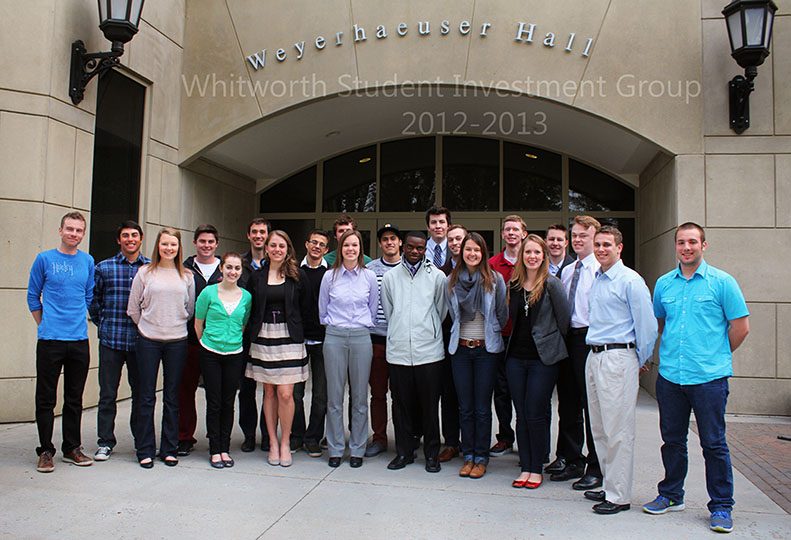
Home » Whitworth investment club set to explore equity world
Whitworth investment club set to explore equity world
Students entrusted with $100,000 in endowment money eye good returns

August 15, 2013
A student investment club formed at Whitworth University north of Spokane in April 2012 got its feet wet during the last school year and will become more fully immersed in the world of stock trading when the new academic year begins this fall.
The club, formally named the Whitworth Student Investment Group (WSIG), isn't making theoretical stock picks with imaginary money. Rather, it's seeking to earn healthy returns on $100,000 in endowment funds that the university's board of trustees agreed to provide after students formulated a proposal for the investment group and presented it to the board. All investment returns will flow back into the Whitworth endowment.
The goal of the club, as its website says, is to "provide students with real-life investing scenarios by actively participating in the trade of securities; to give students the tools to gain exposure to markets and the investing world; and to allow students to influence the management of Whitworth's financial resources and future."
Brian "Duff" Bergquist, executive-in-residence for the Whitworth School of Global Commerce & Management and the club's adviser, says, "It's a good stressor because it puts pressure on the students to do good work, and they know that there is a consequence. You have a fiduciary responsibility to the board of trustees. You can't do a stock simulation, because there's no consequences for a poorly thought-out decision."
What's noteworthy about the club, though, is that it's not tied directly to the business school or chartered through the Associated Students of Whitworth University or open only to students in business-related majors.
Also, it requires dedication. The club, which got up to around 40 students last spring, meets at 6:15 a.m. every Thursday during the school year and its members must undergo training and do a fair bit of market research. The club's officers do the training, and to become an "analyst," a member must make a stock pitch to the rest of the group and be voted in.
Bergquist says it provides "an outlet for a field of study that we haven't had at Whitworth that's been very appealing to a certain group of students."
During the initial months after the club was formed, members focused on learning about the stock market and stock trading, he says. In January, they started preparing and making stock pitches, and in April, the club made relatively small investments in two individual U.S. stocks. It sold those stocks shortly before the end of the school year, and—to continue to have some exposure over the summer months while students were away—put a portion of its stash into exchange-traded funds in sectors the students thought would perform the best, including utilities, pharmaceuticals, consumer staples, and the Standard & Poor's 500 index. It currently is 60 percent invested in those sector funds, holding the other 40 percent of its money in cash, but the club will sell off sector funds and begin focusing more earnestly on individual stocks once the students are back on campus, Bergquist says.
"They will come in in September and start making stock pitches and start investing in single stocks. They're basically still in the formative process, getting this up and running," he says, adding that the group's funds likely will be fully invested by the end of October.
"I would think we would start out the year with between 30 and 40 students and end up between 20 and 30. We do have some attrition. A lot of that is because we meet at six in the morning," and being a member of the group also involves a lot of work separate from members' regular academic studies, he says.
Bergquist, who worked in investment banking for 16 years in Frankfurt and London and was an equity trader, says he believes members of the club who didn't graduate last spring are making a lot of progress.
"They started at zero. They've got a lot to learn, but they've learned a lot," he says. "It will be good for them to go through an earnings season where they have stocks. We're headed in the right direction but it takes a lot of time."
Bergquist says the student investment group is focused on a value investing model, which involves selecting stocks that are believed to be trading for less than their intrinsic values. Also, he says, "We're going to mirror what our endowment committee uses for socially accepted investments."
As the club's adviser, he says his role has been to help the students structure the organization appropriately, to assist them with training when they need it and ask for it, and to critique their ideas.
"It's been a lot of fun. It's great to see the students light the fire of their curiosity," he says.
Austin Vierra, an economics and international business double-major who was the club's president during the last school year and helped get it off the ground before graduating in the spring, told the Journal in April that he found it to be a great "experiential learning opportunity." He said it benefited him in the classroom and he expected to be able to apply what he learned there in the business world after graduating.
"It's exposed a latent desire in me to really pursue a career in finance," Vierra said.
"A lot of students walked in not even knowing what a balance sheet was, or the stock market really, so it was a lot of fun to bridge that gap," he added. "Everyone in the group was very dedicated. It was a project that easily could have died."
Applauding Bergquist, Vierra said the club adviser wasn't afraid "to let us screw up."
Special Report
Related Articles

![Brad head shot[1] web](https://www.spokanejournal.com/ext/resources/2025/03/10/thumb/Brad-Head-Shot[1]_web.jpg?1741642753)


